
TRANSPORTATION RESEARCH PART C-EMERGING TECHNOLOGIES
Scope & Guideline
Unveiling the Future of Transportation Solutions
Introduction
Aims and Scopes
- Emerging Technologies in Transportation:
The journal emphasizes research that explores new technologies in transportation, including connected and autonomous vehicles, electric mobility, and smart infrastructure. - Data-Driven Approaches:
A strong emphasis on the use of big data analytics, machine learning, and AI techniques to derive insights and optimize transportation systems. - Sustainability and Environmental Impact:
Research focused on reducing the environmental impact of transportation systems, including studies on electric vehicles, eco-driving strategies, and sustainable urban mobility. - User-Centric Transportation Solutions:
Papers that explore user behavior, preferences, and the implications of new technologies on travel patterns and mobility choices. - Interdisciplinary Integration:
The journal encourages studies that combine insights from engineering, economics, social sciences, and environmental science to address complex transportation issues.
Trending and Emerging
- Connected and Autonomous Vehicles (CAVs):
Research on CAVs is rapidly expanding, focusing on their impact on traffic flow, safety, and infrastructure requirements. - Electric Mobility and Charging Infrastructure:
With the rise in electric vehicles, studies exploring optimal charging station placement and the integration of electric vehicles into existing transportation networks are increasingly prominent. - Behavioral Insights and User Experience:
There is a growing emphasis on understanding user behavior, preferences, and the overall experience with emerging mobility solutions, including shared mobility and ridesourcing. - Smart Transportation Systems:
Research into smart city technologies and integrated transportation systems that leverage IoT and real-time data to enhance operational efficiency and user satisfaction is on the rise. - Environmental Sustainability and Climate Impact:
Studies focusing on the sustainability of transportation systems, including emissions reduction strategies and the environmental impact of new technologies, are gaining importance.
Declining or Waning
- Traditional Traffic Engineering Models:
Research that relies heavily on classical traffic models without integrating emerging technologies or data-driven approaches is becoming less prevalent. - Static Transportation Planning:
Papers focused on static models for transportation planning are declining in favor of dynamic, real-time models that account for variability and uncertainty in traffic conditions. - Overly Simplistic User Behavior Models:
Studies that do not consider the complexities of human behavior and preferences in transportation are losing traction as more nuanced and sophisticated models gain prominence.
Similar Journals
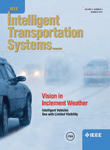
IEEE Intelligent Transportation Systems Magazine
Advancing Technologies for Efficient TransportationIEEE Intelligent Transportation Systems Magazine, published by the IEEE-Institute of Electrical and Electronics Engineers Inc., is a leading journal in the fields of automotive engineering, computer science applications, and mechanical engineering. With an impressive impact factor reflected in its 2023 rankings, this journal sits in the top quartile (Q1) across multiple engineering categories, making it an essential resource for researchers and professionals dedicated to advancing the intelligent transportation systems landscape. The magazine covers a diverse array of topics from vehicle technology innovations to traffic management solutions, aimed at improving transportation efficiency, safety, and sustainability. Since its inception in 2009, the publication has established a solid reputation for disseminating cutting-edge research and practical applications in intelligent transportation, all while remaining an accessible resource for academic and industrial stakeholders alike. Subscribe today to stay at the forefront of transformative transportation technologies!
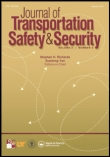
Journal of Transportation Safety & Security
Driving the conversation on transportation safety.The Journal of Transportation Safety & Security (ISSN: 1943-9962; E-ISSN: 1943-9970), published by Taylor & Francis Inc, stands as a pivotal resource for professionals and researchers in the fields of safety research and transportation. Since its inception in 2009, this journal has delivered rigorous peer-reviewed articles that explore critical issues relating to safety and security within the transportation sector. With an impressive impact factor reflecting its scholarly significance—ranking Q1 in Safety Research and Q2 in Transportation as of 2023—this journal occupies a unique position in the academic landscape, encouraging innovation and collaboration among researchers dedicated to improving safety measures. The Scopus rankings further affirm its status, placing it 17th out of 109 in Safety Research and 49th out of 141 in Transportation. Readers can expect contemporary discussions and comprehensive reviews tailored to both practitioners and academics alike, effectively bridging the gap between theory and application. Explore the Journal of Transportation Safety & Security to contribute to a safer and more secure transportation environment.
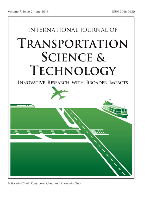
International Journal of Transportation Science and Technology
Connecting research with real-world transportation challenges.The International Journal of Transportation Science and Technology, published by KEAI PUBLISHING LTD, stands as a pivotal resource in the fields of transportation, automotive engineering, civil and structural engineering, and policy management. With a robust Open Access model since its inception in 2012, this journal provides unparalleled visibility to research that impacts real-world transportation systems and infrastructure. The journal proudly holds a Q1 category ranking in crucial engineering fields, reflecting its high impact and quality of published research. Its diverse scope and comprehensive coverage make it an essential platform for researchers, professionals, and students alike who are eager to contribute to the advancement of transportation science and technology. With impressive Scopus rankings underscoring its relevance in environmental science and social sciences related to transport, the International Journal of Transportation Science and Technology continues to foster innovation and influence policy development globally, addressing the challenges of modern transportation systems.
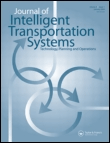
Journal of Intelligent Transportation Systems
Transforming Transportation Through Cutting-Edge ResearchThe Journal of Intelligent Transportation Systems is a premier peer-reviewed journal published by Taylor & Francis Inc, focusing on cutting-edge research in the fields of transportation systems and intelligent technologies. With an ISSN of 1547-2450 and an E-ISSN of 1547-2442, this journal stands out with its impressive impact, consistently ranking in the Q1 Quartile across multiple categories such as Aerospace Engineering, Applied Mathematics, and Automotive Engineering, among others. As of 2023, it holds distinguished Scopus rankings, including a remarkable #11 position in Aerospace Engineering, showcasing its significance in shaping contemporary research in intelligent transportation. Targeted at researchers, professionals, and students alike, the journal provides a forum for the dissemination of innovative ideas and technologies that enhance transportation systems’ efficiency, safety, and sustainability. The Journal of Intelligent Transportation Systems has been operating since 2004 and continues to play a vital role in advancing knowledge within its respective areas of study within the United Kingdom and globally.
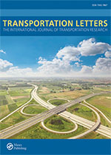
Transportation Letters-The International Journal of Transportation Research
Transforming transportation knowledge into actionable insights.Transportation Letters - The International Journal of Transportation Research, published by Taylor & Francis Ltd, is a leading journal dedicated to advancing the field of transportation studies. With an impact factor that reflects its significance within the academic community and a prestigious ranking of Q2 in Transportation, this journal provides a critical forum for the dissemination of innovative research and insights in transportation systems, policies, and technologies. Covering a broad scope of topics from urban mobility to logistics and infrastructure, Transportation Letters serves as an essential resource for researchers, professionals, and students aiming to deepen their understanding of transportation issues facing society today. With over a decade of publication since 2009, the journal has established a solid reputation, ranking 46th out of 141 in Scopus's transportation category, placing it in the 67th percentile. Although it does not operate under an open-access model, it remains committed to accessibility through various subscription options, ensuring that vital research is available to those shaping the future of transportation.
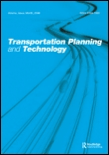
TRANSPORTATION PLANNING AND TECHNOLOGY
Shaping Tomorrow's Transportation Landscape TodayTransportation Planning and Technology is a prestigious academic journal dedicated to advancing the fields of transportation planning and technology. Published by Taylor & Francis Ltd, this journal serves as a critical platform for disseminating high-quality research and innovative practices in the context of urban and regional transportation systems. With an ISSN of 0308-1060 and an E-ISSN of 1029-0354, the journal has established a significant foothold since its inception in 1972, spanning through to 2024. Recognized in the Q2 category of Geography, Planning and Development and the Q3 category of Transportation in the 2023 rankings, it reflects a solid impact factor supported by its Scopus classifications, holding a rank of #270/821 in Geography, Planning and Development and #72/141 in Transportation. Researchers, professionals, and students alike benefit from the journal's comprehensive scope, which encompasses theoretical aspects, practical applications, and policy implications related to transportation systems. As an essential resource in the field, it invites contributions that enhance our understanding of the complexities in transportation planning, making it a must-read for those engaged in related studies.

ITE JOURNAL-INSTITUTE OF TRANSPORTATION ENGINEERS
Pioneering Research for a Sustainable Transportation FutureITE JOURNAL - INSTITUTE OF TRANSPORTATION ENGINEERS is a distinguished publication that serves as a vital resource in the fields of Automotive Engineering and Mechanical Engineering, bridging the gap between research and practical application in transportation systems. Published by the Institute of Transportation Engineers in the United States, this journal has been contributing to the academic discourse since 1978 and continues to be a relevant platform for innovative research and insights. The journal currently holds a Q4 ranking in both Automotive Engineering and Mechanical Engineering categories, reflecting its niche but impactful presence in the Scopus database. Although the journal is not open access, it remains a critical outlet for researchers and professionals looking to advance their knowledge and influence practices in transportation engineering. With its commitment to disseminating quality research, the ITE Journal is a must-read for anyone involved in the transportation sector seeking to stay ahead in this dynamic field.
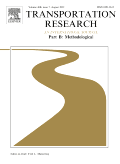
TRANSPORTATION RESEARCH PART B-METHODOLOGICAL
Elevating transportation science through cutting-edge methodologies.TRANSPORTATION RESEARCH PART B - METHODOLOGICAL is a premier academic journal published by Pergamon-Elsevier Science Ltd, focusing on innovative methodologies and solutions in the field of transportation research. With a prestigious Q1 ranking in key categories, including Civil and Structural Engineering, Management Science and Operations Research, and Transportation, the journal demonstrates its vital role in advancing the academic discourse and practical applications within these domains. Boasting an impressive Scopus ranking of #20 in Civil and Structural Engineering and #15 in Transportation, it attracts high-quality research that informs policy, enhances transport systems, and contributes to sustainable development. The journal serves as a critical platform for researchers, practitioners, and students alike to disseminate findings that push the boundaries of transportation science. With a publication history dating from 1979 to 2024, TRANSPORTATION RESEARCH PART B is dedicated to fostering interdisciplinary collaborations and inspiring new methodologies to tackle complex transportation challenges. As a vital resource for the academic community, it leverages a broad international perspective to enrich the field and facilitate cutting-edge research.
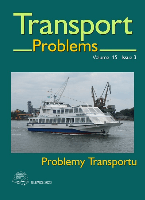
Transport Problems
Driving Knowledge Forward in Automotive and Mechanical EngineeringTransport Problems, published by the Silesian University of Technology, Faculty of Transport, is a distinguished open-access journal that has been advancing scholarship in the fields of Automotive Engineering, Mechanical Engineering, and Transportation since its inception in 2007. With an ISSN of 1896-0596 and an E-ISSN of 2300-861X, this journal serves as a vital platform for researchers and practitioners to disseminate innovative research findings and explore fundamental issues in transport systems and technologies. Based in Poland, the journal covers various topics including transportation logistics, vehicle dynamics, and environmental impacts, thereby addressing critical challenges faced in the transportation sector globally. As reflected in its Scopus rankings, the journal occupies respectable quartiles and continues to contribute valuable insights to the academic community. By making its content freely accessible, Transport Problems significantly enhances the ability of researchers and students alike to engage with the latest developments in transport engineering and contribute to this ever-evolving field.

EURO Journal on Transportation and Logistics
Exploring innovative solutions for a connected world.The EURO Journal on Transportation and Logistics, published by ELSEVIER, is a premier open access journal dedicated to advancing the fields of transportation and logistics. Since its establishment in 2013, the journal has become a vital platform for disseminating cutting-edge research and insights, reflecting its significant impact in the academic community, as evidenced by its Q1 ranking in both Management Science and Operations Research and Modeling and Simulation as of 2023. Hailing from the Netherlands, this journal caters to a diverse array of scholarly disciplines, as highlighted by its ranking within the top quartiles across various Scopus categories including Mathematics, Decision Sciences, and Social Sciences. With a commitment to transparency and accessibility through its open access policy since 2020, the journal strives to engage not only researchers but also professionals and students, fostering a collaborative environment for the exploration of innovative solutions within the transportation and logistics sectors.